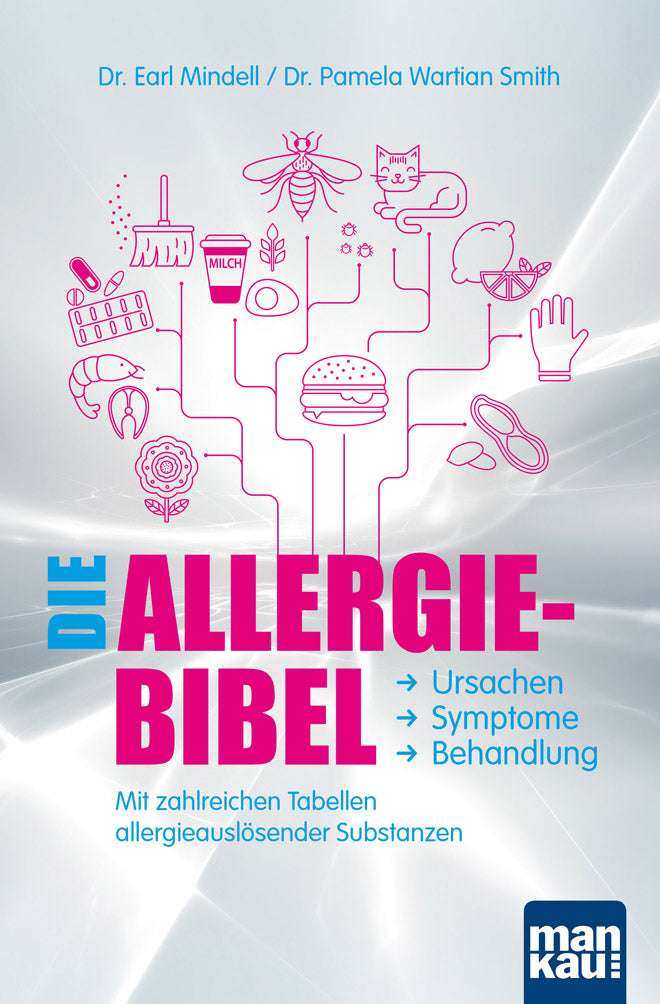
Interview on the topic of allergies: "Often the alternative, natural treatment methods are the best"
Interview on the topic of allergies: "Often the alternative, natural treatment methods are the best"
"The allergy epidemic is primarily due to the tens of thousands of new chemicals and drugs that have been released into our environment in recent years." In an interview , pharmacologist Dr. Earl Mindell and physician Dr. Patricia Wartian Smith , authors of the guidebook "The Allergy Bible," talk about the causes, diagnosis, and treatment options for allergies.
Millions of people suffer from allergies, which continue to spread despite medical advances. What are the causes of this so-called “allergy epidemic”?
Dr. Mindell: The allergy epidemic is primarily due to the tens of thousands of new chemicals and drugs that have been released into our environment in recent years. Because the majority of people spend most of their time indoors, we are also constantly bombarded with a plethora of indoor allergens, such as paint, wall coverings, synthetic fibers, and carpet sprays, and there is a severe lack of fresh air in these artificially enclosed spaces.
Food allergies in children in particular have increased by up to 50 percent in recent years. Which foods most often cause allergic reactions and how is the difference to a food intolerance?
Dr. Mindell: Processed foods - with lots of artificial colors, preservatives and flavor enhancers - are the most common cause of allergic reactions in children who are not yet immunized against these substances and their negative health effects. Common foods such as nuts, shrimp, fruit and dairy products still contain the most allergens for children. Food allergies occur with acute symptoms such as redness, itching, watery eyes and a runny nose. Food intolerances, on the other hand, manifest themselves in gastrointestinal upset and severe, sometimes even life-threatening symptoms.
There are many misconceptions about allergies. What are they and what do you need to know about allergies?
Dr. Mindell: First of all, allergies are not intolerances. Allergies are related to the immune system and are the result of the production of the insulin-like IgE antibody. Occasionally, allergies cause coughing that often lasts for weeks, they trigger sneezing attacks and are often accompanied by a stuffy nose. It is important for people to know and understand that allergies are real and that any of us can get them at any time.
Many people have recurring symptoms such as itching, sneezing or watery eyes. How do you know if you are actually allergic to something and what tests are available?
Dr. Mindell: If you experience symptoms such as itching, sneezing, or watery eyes, you should get tested for possible allergies. Your GP can do a simple skin test. You can also have a blood test to check for IgE antibodies. The food elimination test can be done at home in most cases. Of course, if you suspect a particular food is responsible for your symptoms, the best thing to do is to eliminate it from your diet for a few days; then eat it again to see if the symptoms return.
Allergy sufferers are usually used to arranging their living environment in such a way that their symptoms are reduced or prevented. What can those affected do to avoid allergic reactions or even life-threatening situations at work or when traveling?
Dr. Smith: If your allergy symptoms subside when you stop being exposed to the allergen, you know you have a problem with an allergen in your workplace. The solution is to avoid potential allergens, such as:
• Latex, which is contained in disposable gloves, various products in the workplace and in toys (of children or grandchildren).
• Formaldehyde: Read the labels of products you use in the workplace.
• Diisocyanates are found in coatings and adhesives.
• Air conditioning systems: Check when they were last cleaned and when the filters were replaced.
• Check the air you breathe; invest in air purifiers, which are widely available.
• Use protective devices such as masks and the like.
• Ensure that smoking is not permitted in the workplace.
There is a suspicion that allergies are also linked to the development of other chronic diseases. What are these and what can be done about them?
Dr. Smith: Diseases caused by allergies include: eczema, asthma, sinusitis, conjunctivitis, and a general but persistent swelling of the tongue, eyes, palms, and soles of the feet.
In addition to a whole range of drug therapies, there are also increasingly alternative healing methods that are being used successfully to treat allergies. Which approaches are promising and which methods should allergy sufferers avoid?
Dr. Smith: Often the best alternative, natural treatments are: stress reduction, adequate intake of essential fatty acids, vitamins A, B12, D and E, zinc, probiotics and prebiotics, betaine HCL, burdock root, milk thistle and bindweed, among others. Always do your research before self-medicating.
Book tip:
Mindell, Dr. Earl / Smith, Dr. Patricia Wartian: The Allergy Bible. Causes – Symptoms – Treatment. Hardcover, 318 pages, 16.5 x 24 cm, 24.95 euros (D) / 25.70 euros (A), ISBN 978-3-86374-461-8.
Link recommendations:
More information about the guide book "The Allergy Bible"
To the reading sample in PDF format
More about the author Dr. Patricia Wartian Smith
More about the author Dr. Earl Mindell











